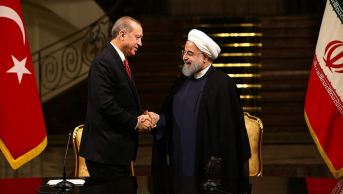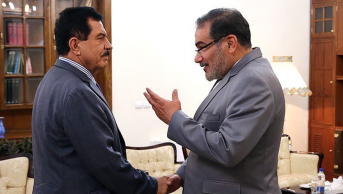Iranian Military Chief Bagheri's Visit to Turkey

Major General Mohammad Hossein Bagheri,Chief of the General Staff of Armed Forces of Iranpaid a a three-day visit to Ankara on August 15, in response to invitation of his Turkish counterpart, General Hulusi Akar. Bagheri was accompanied by a crowded delegation of high-level military officials including Mohammad Pakpur, Commander of the IRGC Ground Forces. In addition to his counterpart Akar, Bagheri held meetings with Chief of MIT (National Intelligence Agency) Hakan Fidan, Defence Minister Nurettin Canikli and President Recep T. Erdogan.
At his arrival to Ankara, Bagheri spoke to Iranian state television and described Turkey as an important neighbor with a vital position in the region and the Islamic world. Heunderlined thatthis visit to Turkey was necessary due to regional developments and security issues. Indeed, bilateral security relations, border security, and the fight against terrorism; developments in Syria, and the bid of Iraq Kurdistan Regional Government's (KRG) to hold e referendum for independence come into prominence during his meetings in Ankara.
Bilateral Security Relations and Border Security
Border security is an important concern for both countries. Turkish officials have long been complaining about PKK crossing the Iranian border to commit terror attacks in Turkish lands. Smuggling and drug trafficking are also challenging issues around the border. Ankara and Tehran took steps towards tightening the border security and to combat terrorism, smuggling and drug trafficking. Starting from 1992, there were several joint commissions for security (High Commission for Security which gathered undersecretaries of interior ministers of the two countries, Joint Security Committee which consisted of Deputy Undersecretaries and Subcommittees on Security which included border guards) holding meetings periodically and numerous protocols were signed. However, after 2010, the bilateral cooperation for security was interrupted. While bilateral political and economic relations kept on growing, security relations remained strained. The disruption of security cooperation despite advancing problems around the border led Turkey to build a 2-meter wide, 3-meter high wall to improve border security. The construction of the wall began in the early days of August and is planned to cover 500 kilometers of the Turkish-Iranian border. Iran supported the idea, hoping the wall boosts the border security and diminishes smuggling.
For Iran, border security has always been a prominent issue due the instability of some of its neighbors and various separatist movements benefiting from the highly permeable nature of borders. Recently, Iranian Kurdish militants such as PKK's Iranian branch PJAK as well as KDP-Iran and Komala have revitalized their activities, which alerted Iran to tighten the security of its western borders. In the last May, two Iranian soldiers died and seven more were injured in a clash between PJAK and Iranian security forces. Then, the commander of Iran's border guards Qassem Rezayee stated that the militants came through the Turkish border. Reminding the country's responsibility to protect its borders, Rezayee blamed Turkey for the incident. Recently, two other developmentshave increased Iranian concerns forsecurity of the western and northeastern (Iraq and Turkey) borders. First, considering the increasing U.S. pressure on Iran under Trump, and the risingtension between Iran and Saudi Arabia, Iranians have been anxious with prospective support of international actors towards Iranian Kurdish movements. In fact, Kurdish militia already escalated their armed attacks inside Iranian soils. Second, the rise of ISIS threat to Iran has prompted its concerns about border security. ISIS, which recently attacked the Iranian parliament building in Tehran in the last June, has been calling Sunnis of the country (Kurds and Balochis) to rise up against the Shia regime.
Following these incidents, the security of the Turkish border in the northwest of Iran has become even more significant for Tehran. In this respect, a joint working group was formed to enhance security cooperation between Turkey and Iran; and Undersecretaries of the Ministry of Interiors of both countries held the first meeting in Tehran on July 25. Commenting on Bagheri's visit to Turkey, Revolutionary Guards spokesperson Ramazan Sharif stated his country is seeking a good deal with Turkey to improve border security.
At Bagheri's visit to Turkey, both countries agreed on more meetings among senior security officials of the countries. According to Bagheri's account, Turkey and Iran settled upon arranging joint training programs, exchanging military students and sharing intelligence to combat terrorism. President Erdoğanalso stated that soon, Iran and Turkey might conduct a joint operation to Sinjar and Qandil Mountains where PKK is located. According to Erdoğan, this issue has long been on the table and is also recently discussed during Bagheri's visit.
Regional Issues and Ankara-Tehran Relations
The recent developments in Syria were another issue that came up during the talks of Bagheri in Ankara. Having been partners in the Astana talks, Turkey and Iran are currently working on the formation of de-escalation zones in Syria. During Bagheri's visit, the two countries affirmed their resolution to maintain Astana talks and holding political meetings to establish peace and security in Syria, to buildde-escalation zones and to find a definitive solution to the Syrian issue.
KRG's bid for independence referendum was also on the agenda of the meetings. Both Ankara and Tehran stand out against the independence referendum claiming under current conditions it would only lead to further instability in Iraq as well as in the region. In a statement upon his return from Ankara, Bagheri said the referendum is not only an Iraqi issue, but also involves Turkey and Iran, both of whom are in agreement for cancellation of the referendum.
Despite their differences on regional visions and policies, Turkey and Iran share the same perspective on the necessity of protecting territorial integrity of Syria and Iraq, and they share threats arising from terrorism (ISIS and PKK). Both countries are concerned about the U.S. cooperation with PYD, Syrian branch of PKK. Similarly, both Iran and Turkey are startled to see the U.S. and Russia agreed on ceasefire in southern Syria. The rise of common threats in the region has brought Ankara and Tehran closer. In this regard, the visit of former Turkish Prime Minister Ahmet Davutoglu's to Tehran in March 2015 could be considered as a milestone, when he called "the destiny of this region should not be leaved to external forces." Since then bilateral relations between the two countriesfind a new momentum. The ties have grown even stronger after Iranian support for Turkey in the face of theJuly 15 coup attempt.
Security elites in both countries have traditionally been skeptical towards one another due to some ideological, historical, and strategic reasons. Therefore, security relations and military cooperation between the two countries were out of question. Therefore, the fact that Bagheri, who took over the post of the Chief of Staff for the Iranian Armed Forces in July 2016, made his first foreign trip to Turkey becomes truly historical.It was the first meeting among senior military officials of Turkey and Iran thereby it indicates the relations between these two countries have gone beyond economic and political aspects in order to enhance cooperation on security and regional issues. Bagheri underlined thatSupreme Leader of Iran, Ayatollah Ali Khamenei, approved this visit. This statement illustrates the willingness of all parts of the Iranian administration to increase security relations with Turkey.










